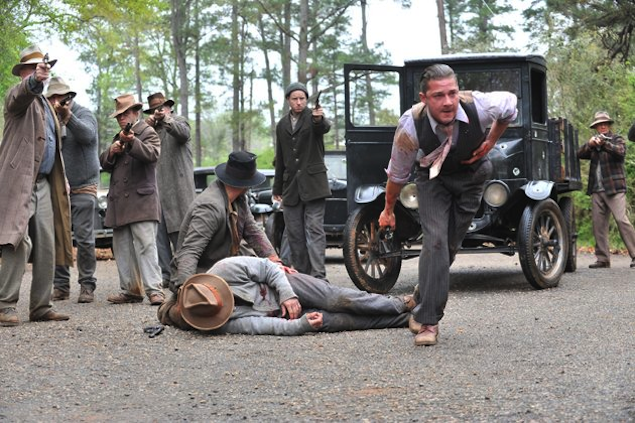In 1996, Nick Cave released an album of murder ballads, that age-old subgenre of balladry
that tells stories of death and violence. There are no big surprises in the murder
ballad; what’s going to happen is embedded in the genre heading, and it’s all about
how artfully one can spin that story out, drawing the listener in and then horrifying
them with the specifics of the tale. Cave also wrote the script for director
John Hillcoat’s
Lawless, based on Matt Bondurant’s historical novel
The Wettest County in the World, and it plays out much like the cinematic equivalent of a murder ballad: rambling,
violent, and more concerned with style and presentation than meaningful character
development.
That last quality might sound like a complaint, but it’s really not; this is pure
genre cinema, a classic gangster movie with modern sensibilities for screen violence.
Nicolas Winding Refn’s
Drive stuck close to film noir conventions so that the film rode to success largely on
style, and Hillcoat does the same with this story of bootleggers in Franklin County,
Virginia, in the final years of Prohibition.
Ostensibly the story of Jack (Shia LaBeouf), the youngest of three brothers, Jack mainly exists to drive the story forward by
constantly creating messes that his two older brothers need to clean up. The performances
are uniformly excellent, even though many of the characters are so caricatured that
they chew the scenery relentlessly. There’s
Tom Hardy as the leader of the brothers, speaking in an Appalachian mumble that sometimes doesn’t
rise above grunts and guttural noises;
Gary Oldman as a smart and violent gangster with whom Jack goes into business;
Mia Wasikowska in an endearing and sly turn as the innocent preacher’s daughter Jack falls for;
and
Guy Pearce, with slick black hair and practically devoid of eyebrows, as a villain so evil and
slippery he gives Voldermort himself a run for his money as most serpentine screen
bad guy. Take those, add a dash of grisly violence and some surprisingly laugh-out-loud
black humor, and
Lawless is fantastic, if thematically lightweight, fun.
View the trailer. Now playing at theaters
across the area.
Comedian
Mike Birbiglia took his own experiences with a fairly serious sleepwalking disorder and turned them
into a book, a comedy record, and a hit one-man show. Now, with the help of NPR’s
This American Life host
Ira Glass, he’s also turned it into a feature film in which he plays Matt Pandamiglio, a standup
comedian who is in a holding pattern with his career and his relationship and dealing
with that sleepwalking, which puts him in both amusing and potentially life-threatening
situations.
View the trailer. Opens tomorrow at E
Street.
A Tribute to John Cage
Korean-American artist
Nam June Paik made his reputation creating some of the earliest video art, but his original training
was as a pianist. Given that, and Paik’s commitment to experimentation, it’s appropriate
that he ended up making a documentary about John Cage, the composer whose experiments
in incorporating nonmusical sounds in music helped to inspire much of Paik’s art.
Next week’s presentation of that film at the American Art Museum is of a previously
unscreened version, and is being shown in celebration of what would have been Cage’s
100th birthday.
John Hanhardt, senior curator for media arts at the museum, will introduce the program and lead
a discussion afterward.
Wednesday at 7 PM at the Smithsonian American Art Museum.
During the month of September, the National Gallery is turning its attentions to
Aleksei German, a Russian filmmaker who is virtually unknown in the US, who has made just half a
dozen films since his first, way back in 1967. That count includes one that is still
in post-production, and which has reportedly been in various stages of production
for over a decade. The museum is screening all five of the completed films, along
with one he wrote and produced but didn’t direct, starting with his most recent,
Khrustalyov, My Car! Like most of his films, it’s a black-and-white picture set in Stalin’s Soviet Union
about a doctor accused of taking part in the so-called “doctor’s plot,” in which many
mostly Jewish doctors were accused of plotting to kill Soviet leaders.
Sunday at 4:30 PM at the National Gallery of Art.
If you didn’t get enough to satisfy your need for Prohibition-era drama from
Lawless, Washington Psychotronic Film Society has a somewhat lighter
take on the period with a screening of the 1976 musical
Bugsy Malone. The film was a bomb on release, despite a warm reception at Cannes and generally
positive reviews; audiences in 1976 just didn’t seem primed for a crime musical that
starred only children, with adults dubbing their singing voices.
Bugsy features the film debut of
Charles in Charge himself,
Scott Baio, as Bugsy, and the then-13-year-old child star
Jodie Foster as the singer at the speakeasy that he frequents.
View the trailer. Monday at 8 PM at McFadden’s.
WPFS screenings are free, but a $5
donation is
suggested.
DVD Pick of the Week:
Quadrophenia
The Who’s
Tommy gets more attention—the splashy, fantastical rock opera about a deaf, dumb, and blind
kid with a mystical talent for pinball inspired a film version that was a vision of
cinematic excess (which I mean as a compliment). But
Quadrophenia is that record’s smarter younger sibling, the one that doesn’t immediately grab your
attention but tends to win you over once you’ve spent time with it.
Just as the filmed version of
Tommy amped that record up to unforeseen levels of overkill, the movie of
Quadrophenia shares its inspiration’s less ostentatious power. Franc Roddam’s film uses the Who’s
music, but the film isn’t a musical; it takes the basic framework of the record’s
concept, about a young man’s difficult coming of age in 1960s London, and makes a
drama out of it that’s as affecting and rewatchable as the record is endlessly listenable.
Special Features: Commentary from director
Franc Roddam and cinematographer
Brian Tufano; interviews with
Bill Curbishley,the film’s co-producer and the Who’s co-manager, and
Bob Pridden,the Who’s sound engineer; a segment on the film from a 1979 episode of the BBC series
Talking Pictures, featuring interviews and on-set footage; a segment from a 1964 episode of the French
news program
Sept jours du monde, about mods and rockers; “Mods,” a 1965 episode of the French youth-culture program
Seize millions de jeunes, featuring early footage of the Who; theatrical trailers; and a booklet with an essay
by critic
Howard Hampton, a 1985 personal history by original mod
Irish Jack, and
Pete Townshend’s liner notes from the 1973 album.


















